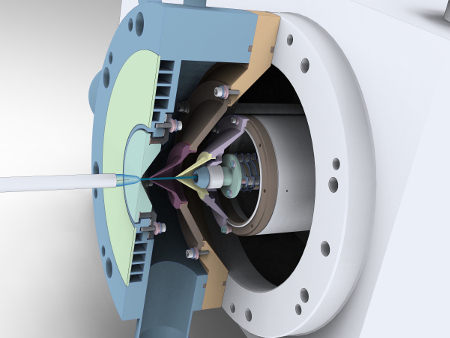Molecular beam mass spectrometry (MBMS) is used for quantitative gas analysis of reactive species and intermediates formed in various processes. Gas phase intermediates are sampled from reaction chambers using a differentially-pumped inlet, which forms a molecular beam of radicals, ions, polymers, or clusters. This is directed through a vacuum chamber and onto an ion detector. Due to the unidirectional motion of the molecular beam, sampled species undergo no subsequent reactions and will not collide with the interior of the sampling chamber. Species in the molecular beam are therefore entirely representative of the process species, enabling quantitative gas analysis of gas phase reactants.

The Hiden HPR-60 MBMS includes a special vacuum configuration with a < mach cone angle separation of the sampling skimmer cones. This creates the collision-less molecular beam that allows the mass spectrometer to sample ions, neutrals, and radicals at high pressure. A suite of additional features is included to address various applications across a pressure range of 10-4 mbar to atmospheric. In this blog post, we will explore the capabilities of the HPR-60 MBMS in more detail.
HPR-60 MBMS Gas Analysis
The HPR-60 MBMS features a modular two or three stage, close-coupled mach disc separated skimmer inlet with cone orifices that can be easily replaced by experienced users. The sampling skimmer cones are available in a choice of materials, including ceramic, platinum and quartz. The skimmer system directs the molecular beam into a triple filter precision mass spectrometer, via a low profile electron impact ion source. This provides rapid sampling of reactive gas species from processes in real-time, with mass range options of 50, 300, 500, 1000, or 5000 atomic mass units (amu).
The MBMS gas analysis instrument is equipped for a range of operating modes including:
- Threshold Ionisation
- Electron Attachment Ionisation
- Positive/Negative Ions
- Ion Energy Distribution
- Bar/Profile Scanning
The aforementioned operating pressures are dependent on the configuration, which is generally determined by distinct gas analysis applications. Yet each mode is supported by the same data acquisition and control systems. Supplied with MASsoft Professional software, the HPR-60 MBMS is equipped for extremely high throughput analysis of reactive gas species in a molecular beam for reliable monitoring and evaluation of process chemistries. The software is also connected via a light-emitting diode opto-detector to the integrated multi-bladed rotating disc chopper and ultra-high vacuum (UHV) stepper motor for programmable signal gating of molecular beam chopping for increased sensitivity.
This unique instrument is suitable for gas analysis in an array of application areas, from process monitoring of chemical vapour deposition (CVD) processes to environmental and atmospheric chemistry studies.
Gas Analysis with Hiden Analytical
Hiden Analytical is the UK’s leading supplier of quadrupole mass spectrometers for gas analysis and process monitoring. The HPR-60 MBMS featured above is one of several specialist gas analysis system configurations available from Hiden.
The Hiden QIC Series instruments include a heated capillary sampling system for real time gas analysis, the HPR-70 systems are configured for small discreet sample gas analysis where sample volume available for gas analysis is very small, and the HPR-90 systems are configured for gas analysis from enclosed volumes, light bulb gas analysis for example.
The Hiden HPR-40 instruments are designed for gas analysis of gases dissolved in liquid, for groundwater studies, pollution monitoring and for gas analysis applications in electrochemistry.
We have developed an extensive range of tools uniquely suited for quantitative analysis of reactive gas species via molecular beams. Our proprietary MASsoft Professional is also now available with new tools for automated gas analysis. If you have any questions about our HPR-60 MBMS, please contact a member of the team directly.

